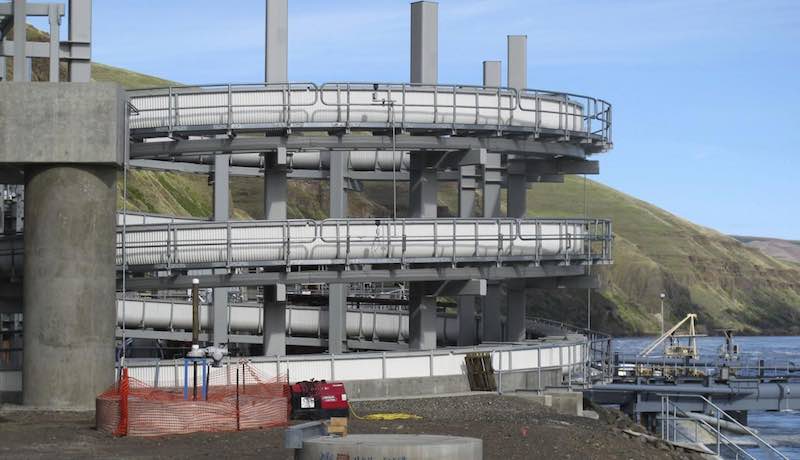forum
library
tutorial
contact

House Pushes Back on judge's Columbia,
Snake Dams Ruling. Next Up, the Senate
by Annette Cary
Idaho Statesman, April 25, 2018
|
the film forum library tutorial contact |

|
House Pushes Back on judge's Columbia,
by Annette Cary
|
 The U.S. House approved a bill Wednesday to protect the Columbia and Snake river dams.
The U.S. House approved a bill Wednesday to protect the Columbia and Snake river dams.
The bill passed 225-189.
It now goes to the U.S. Senate, where it could face a tougher path to passage. Influential Sen. Patty Murray, D-Wash., has concerns about the bill.
The bill reaffirms Congress' authority over the Columbia and Snake river dams by requiring congressional approval to pursue breaching, or tearing down, the four lower Snake River dams.
The bill also would stop the increased spilling over Columbia and Snake river dams that started this month.
U.S. District Judge Michael Simon in Portland found the operating plan for the dams does not do enough to protect endangered fish. He ordered more water to spill over the dam to help young salmon migrating to the ocean.
Water spilled over the dams cannot be used to produce hydropower.
Northwest residents can expect to pay $40 million more for electricity because of the increased spill on the dams this month through mid-June, and for each spring the increased spill continues.
Of Idaho's two congressmen, Rep. Mike Simpson voted in favor of the legislation. Rep. Raul Labrador, who is running for governor, was in Idaho making several stops on his "Fighting For Idaho" campaign tour and did not cast a vote. Labrador backed the bill in a committee hearing earlier this month and has been an outspoken supporter, releasing press statements critical of Simon's ruling.
Both Simpson and Labrador are Republicans.
Simon also ordered a new environmental study looking at options for operating the dams. The study is required to look at the benefits and drawbacks of tearing down the four lower Snake River dams.
The study will go on, but the bill would keep the plan used to operate the Snake River dams in place until at least 2022, according to the bill's sponsors.
The plan, the 2014 Federal Columbia River Biological Opinion, or BiOp, was created by a collaboration of federal agencies, states and eight tribes during the Obama administration to protect salmon while operating hydropower dams.
The BiOp has long been scheduled for review in 2022.
The House bill was authored by Rep. Cathy McMorris Rodgers, R-Wash., and its bipartisan Western state sponsors included Rep. Dan Newhouse, R-Wash.
"Dams and fish can coexist, and after more than two decades in the courtroom, let's let scientists, not judges, manage our river system and get to work to further improve fish recovery efforts," McMorris Rodgers said.
"When the sun doesn't shine and the wind doesn't blow, our dams provide critical baseload energy to power homes and businesses all across Eastern Washington and the Pacific Northwest," she said.
Newhouse said in a news media call after the House vote that extra spill could not only increase power costs, but could interfere with irrigation and barging on the river if water behind the dams gets too low.
Utilities have raised the possibilities of blackouts, he said.
Opponents of the increased spill say it would do little to help salmon and could actually harm them by increasing the gases in the water, which can kill young salmon.
Environmental and fishing groups that support the increased spill have dubbed the bill the "Salmon Extinction Act."
"It will continue the march toward extinction for Snake River salmon that are so necessary to our life and culture," said Julian Matthews, a member of the Nez Perce Tribe.
Todd True, an Earthjustice attorney, said that the "entire goal of the bill is to circumvent the law and the courts, because a few legislators want to put a narrow set of economic interests ahead of the broad support in our region for salmon restoration."
Senate passage of the bill will be a challenge, as senators look to Washington's two Democratic senators for guidance, Newhouse said.
"There is an ongoing legal process intended to account for all uses of our critical river system and a court-mandates comprehensive review that everyone can participate in, so I oppose this legislation that would cut off and politicize what should be a robust and transparent process," Sen. Patty Murray, D-Wash., said in a statement Wednesday.
Murray sent a letter to Senate and House leadership in February, saying that the bill would undermine the important, ongoing work of the environmental study and force the use of the 2014 BiOp, which the court has found to be flawed.
The bill is "a one-size-fits-all congressional approach in place of a vital deliberative and judicial process meant to account for all uses" of the Columbia and Snake rivers, the letter said.
It would circumvent the judicial branch and ignore bedrock environmental laws, the letter said.
learn more on topics covered in the film
see the video
read the script
learn the songs
discussion forum
